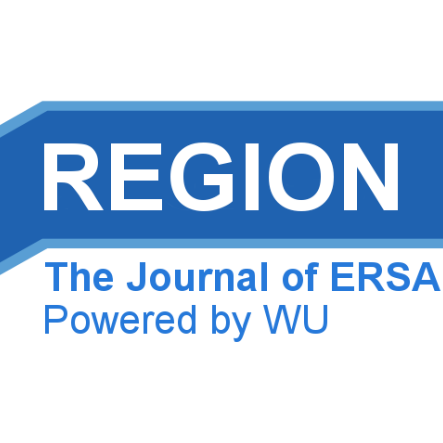Well-being in cities and regions: measurement, analysis and policy practices
DOI:
https://doi.org/10.18335/region.v4i2.188Keywords:
Well-being, Cities, Regions, Special IssueAbstract
This note introduces the special issue on Well-being in cities and regions: measurement, analysis and policy practices. After highlighting the importance of well-being research, this contribution provides a rationale for focusing on the local level rather than looking at country averages for both analytical and policy purposes. While introducing the papers in this Special Issue, we highlight the need to focus on the regional and local factors that improve people’s well-being and the need to understand the link between objective and subjective measures of well-being so that better use is made of them in policy making.References
Ballas, D. (2013), “What makes a ‘happy city’?” Cities, 32, pp. S39-S50.
Brezzi, M., De Mello, L., Laurent, É. (2016), “Au-delà du PIB, en-deçà du PIB. Mesurer le bien-être territorial dans l’OCDE”, Revue de l’OFCE, 145, pp. 13-32.
Brown, Z.S., Oueslati, W., Silva, J. (2015), “Exploring the Effect of Urban Structure on Individual Well-Being,” OECD Environment Working Papers 95, OECD Publishing.
Di Tella, R and R MacCulloch (2010), “Happiness Adaptation to Income Beyond ‘Basic Needs’”, in E Diener, J Helliwell, and D Kahneman (eds), International Differences in Well-Being, Oxford: Oxford University Press.
Durand, M. (2015), “The OECD Better Life initiative: How’s Life and the measurement of well-being”, Review of Income and Wealth, 61(1), pp. 4-17.
Easterlin, R A (1995), “Will Raising the Incomes of All Increase the Happiness of All?”, Journal of Economic Behavior and Organization, 27: 35–47.
Ezcurra, R., Rodríguez-Pose, A. (2014), “Government Quality and Spatial Inequality: A Cross-Country Analysis”, Environment and Planning A Vol 46(7), pp. 1732-1753.
Grimes, A., Ormsby, J., Robinson, A., Wong, S.Y. (2017), “Subjective Wellbeing Impacts of National and Subnational Fiscal Policies”, Region (in this issue).
Lenzi, C. and Perucca, G. (2017), “Life satisfaction in Romanian cities on the road from post-communism transition to EU accession”, Region (in this issue).
Michelangeli, A., Peluso, E. (2017), “Cities and Inequality”, Region (in this issue).
Morrison, P.S. (2017), “Pride in the city”, Region (in this issue).
OECD (2016), Regions at a Glance 2016. OECD Publishing, Paris.
Okulicz-Kozaryn, A. (2015). Happiness and Place: Why Life is Better Outside of the City. Springer.
Proto E and A Rustichini (2013), “A Reassessment of the Relationship between GDP and Life Satisfaction”, PLoS ONE, 8(11): e79358.
Rodríguez-Pose, A. and Maslauskaite, K. (2011), “Can policy make us happier? Individual characteristics, socio-economic factors and life satisfaction in Central and Eastern Europe”, Cambridge Journal of Regions, Economy and Society 5, pp. 77–96.
Stiglitz, J. E., A. Sen, and J-P. Fitoussi (2009), “Mismeasuring Our Lives: Why GDP Doesn’t Add Up,” report by the Commission on the Measurement of Economic Performance and Social Progress, The New Press.
Veneri, P. and F. Murtin (2016), “Where is inclusive growth happening? Mapping multi-dimensional living standards in OECD regions”, OECD Statistics Working Papers, No. 2016/01, OECD Publishing, Paris, http://dx.doi.org/10.1787/5jm3nptzwsxq-en.
Published
How to Cite
Issue
Section
License
REGION is an open journal, and uses the standard Creative Commons license: Copyright We want authors to retain the maximum control over their work consistent with the first goal. For this reason, authors who publish in REGION will release their articles under the Creative Commons Attribution license. This license allows anyone to copy and distribute the article provided that appropriate attribution is given to REGION and the authors. For details of the rights authors grant users of their work, see the "human-readable summary" of the license, with a link to the full license. (Note that "you" refers to a user, not an author, in the summary.) Upon submission, the authors agree that the following three items are true: 1) The manuscript named above: a) represents valid work and neither it nor any other that I have written with substantially similar content has been published before in any form except as a preprint, b) is not concurrently submitted to another publication, and c) does not infringe anyone’s copyright. The Author(s) holds ERSA, WU, REGION, and the Editors of REGION harmless against all copyright claims. d) I have, or a coauthor has, had sufficient access to the data to verify the manuscript’s scientific integrity. 2) If asked, I will provide or fully cooperate in providing the data on which the manuscript is based so the editors or their assignees can examine it (where possible) 3) For papers with more than one author, I as the submitter have the permission of the coauthors to submit this work, and all authors agree that the corresponding author will be the main correspondent with the editorial office, and review the edited manuscript and proof. If there is only one author, I will be the corresponding author and agree to handle these responsibilities.




